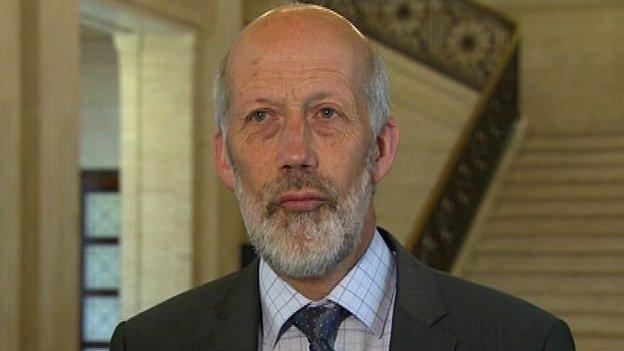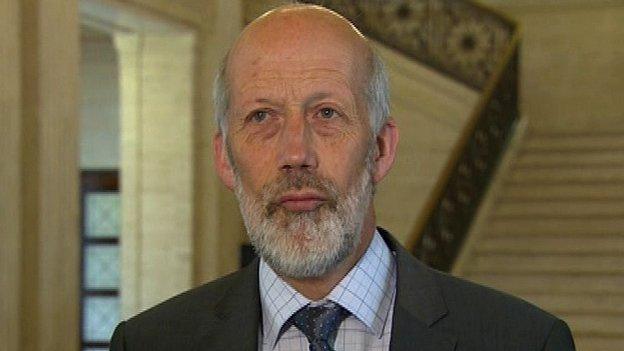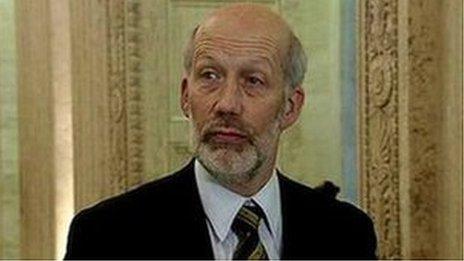NI abortion law: Ford surprised at Robinson comments
- Published

Justice Minister David Ford brought forward his plan for legislation following a consultation
Justice minister David Ford has expressed surprise that First Minister Peter Robinson said his recommendation to change the abortion law on fatal foetal abnormality cases was doomed.
Mr Robinson said proposed draft guidelines offered a better way forward than legislation.
Mr Ford said last month he would ask the executive to approve legislation for abortion in such cases.
He said Mr Robinson had made "a complete U-turn".
Consultation
The issue of fatal foetal abnormality has been examined by health and justice officials over the past 18 months, following a high-profile case featured on the BBC's Nolan Show.
Mr Ford had put forward his plan for legislation in such cases following consultation on reforming Northern Ireland's abortion law.

Peter Robinson said guidelines would provide a better way forward than legislation
However, on Thursday night Mr Robinson told the BBC that draft guidelines to be published soon would be a better way to move forward.
"There are draft guidelines that are working their way through," he told the View.
"I expect within the next week or so we will have a draft of them at the executive and hopefully ministers can look at a better way through guidelines."
Many obstetricians say a law would offer a mother and themselves better protections. They also say guidelines could work if they were to offer choice, protection and involved clinicians in the decision-making process.
At present, women who have become pregnant as the result of rape, or who are told they are carrying a child that is too ill to survive, are not entitled to a legal abortion in Northern Ireland.
'Dreadful circumstances'
Mr Ford said a change in the law was the only way to resolve the issue so that women in such "dreadful circumstances" could have a termination in Northern Ireland "in a way that I believe a compassionate society should provide".
"It was a complete U-turn from the position that had been previously adopted by Peter Robinson and other members of the DUP when they talked about allowing a free vote on the legislation," he told the BBC's Good Morning Ulster.
"To suggest that guidelines can solve this issue is complete nonsense - guidelines explain the law as it currently stands, and these guidelines have been floating around since 2009 with various legal challenges."

Sarah Ewart spoke to the BBC in 2013 about her experience of travelling to England for an abortion
The issue of fatal foetal abnormality came to the fore when Northern Ireland woman Sarah Ewart contacted the Nolan Show to highlight the choice she faced - of either carrying her baby until it died in her womb or travelling to Great Britain where she could access a legal termination.
A year later, in October 2014, the Department of Justice began its consultation, where the public were asked to comment on amending the criminal law on abortion.
In April of this year, the justice committee heard there was substantial support for limited changes to the law, which should also include a conscience clause in the legislation to allow doctors and nurses to opt out of the termination procedure, but not in the woman's aftercare.

Abortion law and Northern Ireland
The laws covering abortion in Northern Ireland are the 1861 Offences against the Person Act, and the Criminal Justice act from 1945. It is a criminal offence, which carries a life sentence.
The only exceptions are to save a woman's life, or if there is a risk of permanent and serious damage to her mental or physical health.
More than 1,000 women a year who do not fit in these categories travel from Northern Ireland each year to have an abortion in other parts of the UK.
In England, Wales and Scotland access to abortion is covered by the 1967 Abortion Act. That permits terminations up to 24 weeks of pregnancy on grounds that include risk to the physical or mental health of the woman or existing children in the family, and abnormalities that could lead to a child being "seriously handicapped".
It is also allowed over 24 weeks if a woman's life or health is at serious risk, and for serious disabilities.
- Published16 April 2015

- Published18 August 2014

- Published5 December 2013

- Published9 October 2013
